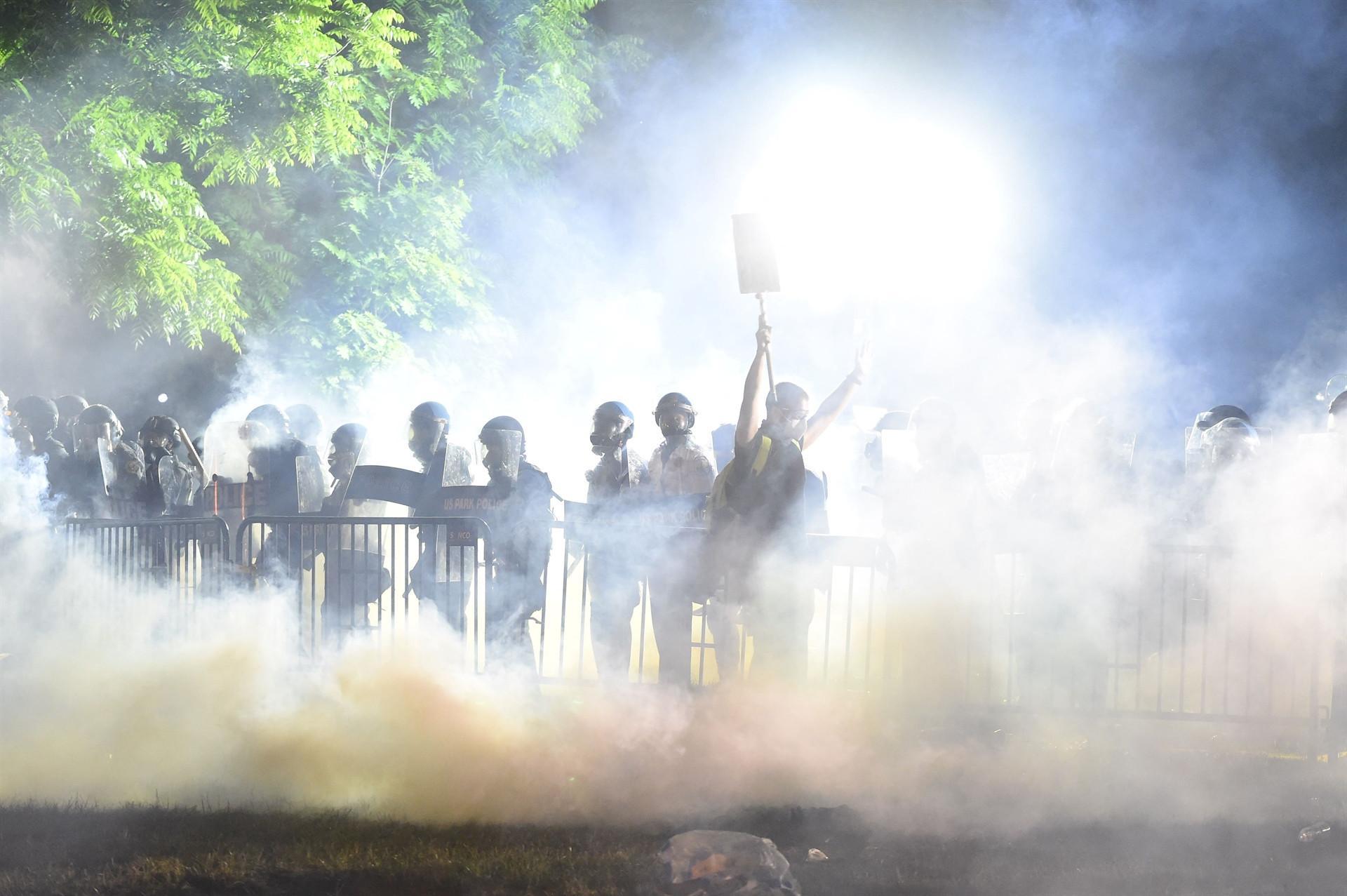
Major U.S. cities feared another night of violent protests on May 31 over the death of George Floyd in police custody, cleaning up broken glass and burned out cars after curfews failed to stop confrontations between activists and law enforcement.
What began as peaceful demonstrations over the death of Floyd, who died as a white Minneapolis police officer knelt on his neck, have become a wave of outrage sweeping a politically and racially divided nation.
Protesters have flooded streets after weeks of lockdowns during the coronavirus pandemic that threw millions out of work and hit minority communities especially hard.
As demonstrators broke windows and set fires, police fired rubber bullets and tear gas to disperse crowds in many cities. In some cases, bystanders and members of the media were targeted.
In one video from Minneapolis, a National Guard Humvee rolls down a residential street followed by what appear to be police officers wearing tactical gear. An officer orders residents to go inside, then yells "light 'em up" before shooting projectiles at a group of people on their front porch. The city's curfew does not apply to residents outside on their private property.
In New York City, police arrested about 350 people overnight and 30 officers suffered minor injuries. Mayor Bill de Blasio said police conduct was being investigated, including widely shared videos showing a police sports utility vehicle in Brooklyn lurching into a crowd of protesters who were pelting it with debris.
De Blasio said he had not seen a separate video showing an officer pulling down the mask of a black protester who had his hands in the air, then spraying a substance in his face.
The closely packed crowds and demonstrators not wearing masks sparked fears of a resurgence of COVID-19, which has killed more than 100,000 Americans.
Violence spread overnight despite curfews in several major cities rocked by civil unrest in recent days, including Atlanta, Los Angeles, Philadelphia, Denver, Cincinnati, Portland, Oregon, and Louisville, Kentucky.
Philadelphia on May 31 moved the city's curfew earlier, to 6 p.m. from 8 p.m. local time, and ordered all businesses to close as local TXF-TV showed images of groups of protesters attacking police cars, setting one on fire. Other people went into nearby stores and came out with armfuls of merchandise.
Protests also flared in Chicago, Seattle, Salt Lake City, Cleveland, and Dallas, where rioters were seen on video beating a store owner who chased them with a large machete or sword. Police said on May 31 he was in a stable condition.
National guard in Minneapolis
The clashes in Minneapolis marked the fifth night of arson, looting and vandalism in parts of the state's largest city, and its adjacent capital, St. Paul. The state's governor said on May 30 that he was activating the full Minnesota National Guard for the first time since World War Two.
Thousands of people gathered peacefully on May 31 afternoon for a rally in St. Paul as state troopers surrounded the state capitol building. About 170 stores in the city have been looted, its mayor told CNN.
"There is no real one answer but the beginning is we have to learn to be honest with each other," said 66-year-old community activist Philip Holmes as he stood among demonstrators holding "Black Lives Matter" signs.
In Santa Monica, California on May 31, hundreds of protesters marched peacefully down Ocean Avenue, parallel to the city's famed beaches. A line of police officers stood at the entrance to the Santa Monica Pier, local KTLA-TV said.
Several hundred demonstrators marching through downtown Miami stopped between the federal courthouse, FBI offices, and the federal detention center chanting "no justice, no peace." Inmates could be seen in the narrow windows waving shirts.
While covering the protests in Minneapolis on May 30 night, two members of a Reuters TV crew were hit by rubber bullets and a Reuters photographer's camera was smashed as attacks against journalists covering civil unrest in U.S. cities intensified.
In response to the protests, Target Corp announced it was closing 100 stores, about 30 of them in Minnesota.
The administration of President Donald Trump, who has called protesters "thugs", will not federalize and take control of the National Guard for now, national security adviser Robert O'Brien said on May 31.
Trump said on May 31 that the U.S. government will designate anti-fascist group Antifa as a terrorist organization. It was not clear how many of the protesters participating in demonstrations are from Antifa.
"Get tough Democrat Mayors and Governors," Trump said on Twitter on May 31 afternoon. "These people are ANARCHISTS. Call in our National Guard NOW. The World is watching and laughing at you and Sleepy Joe. Is this what America wants? NO!!!"
"Sleepy Joe" is Trump's nickname for Joe Biden, the presumptive Democratic nominee for November's presidential election.
The arrest on murder charges on May 29 of Derek Chauvin, the police officer seen kneeling on Floyd's neck, has failed to satisfy protesters. Three officers who stood by as Floyd died have yet to be charged.
Floyd's name is only the latest to be chanted by protesters over the perceived lack of police accountability for violent encounters that resulted in the death of black men.